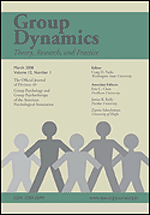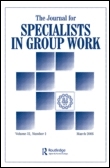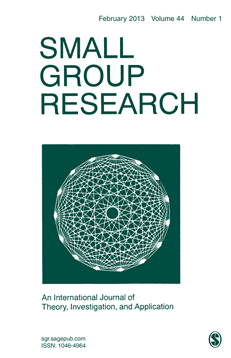
GROUP DYNAMICS-THEORY RESEARCH AND PRACTICE
Scope & Guideline
Transforming Understanding of Group Behavior
Introduction
Aims and Scopes
- Group Therapy and Mental Health:
The journal places significant emphasis on evidence-based practices in group therapy, exploring various mental health issues such as eating disorders, severe mental illness, and substance use disorders. This focus highlights the importance of collaborative therapeutic environments and the efficacy of group interventions. - Team Dynamics and Organizational Behavior:
Research on team dynamics, including topics like team cohesion, conflict resolution, and leadership roles, is prevalent. The journal investigates how group processes influence performance, innovation, and emotional well-being in organizational contexts. - Cultural and Social Processes in Groups:
The journal explores how cultural diversity, social norms, and shared emotional experiences shape group interactions and outcomes. This includes studies on multicultural orientations and the impact of social influences on group behavior. - Methodological Innovations in Group Research:
A commitment to advancing methodological rigor is evident, with a focus on innovative data analytic methods, coding systems, and psychological assessments that enhance the understanding of group dynamics. - Application of Theoretical Models:
Theoretical contributions that provide frameworks for understanding complex group interactions, such as the oscillation model of opinion expression, are a hallmark of the journal. This includes the application of established theories in new contexts.
Trending and Emerging
- Impact of Technology on Group Dynamics:
The transition to online group therapy during the COVID-19 pandemic has sparked interest in understanding how technology influences group processes, therapeutic relationships, and overall effectiveness in virtual settings. - Psychological Safety and Team Innovation:
Research focusing on the role of psychological safety in fostering innovation and constructive conflict within teams is gaining traction. This highlights the importance of creating environments where team members feel secure to express ideas and dissent. - Multicultural and Diversity Considerations in Groups:
There is an increasing emphasis on multicultural orientations and their effects on group dynamics, particularly regarding self-disclosure and cohesion. This trend underscores the need for culturally responsive practices in group settings. - Complexity in Group Processes:
Emerging studies are exploring the complexities of group dynamics, including synchronization, engagement patterns, and the interplay of emotions within groups. This reflects a deeper understanding of the multifaceted nature of group interactions. - Application of Advanced Analytical Techniques:
The use of sophisticated analytical methods, such as polynomial regression and actor-partner interdependence modeling, is on the rise. This trend indicates a move towards more robust statistical approaches to unpack the intricacies of group behavior.
Declining or Waning
- Traditional Group Therapy Approaches:
While group therapy remains a core focus, there has been a noticeable decline in studies centered solely around traditional methods without innovative adaptations. This may indicate a shift towards more evidence-based and integrative approaches that combine multiple therapeutic modalities. - Static Models of Group Behavior:
Research utilizing static or overly simplistic models to analyze group behavior has decreased. There is a growing preference for dynamic models that account for the complexities and fluctuations inherent in group interactions. - Generalized Studies on Group Composition:
Earlier publications often addressed general group composition factors without delving into specifics. Recently, the trend has shifted towards more nuanced explorations that consider specific variables such as cultural diversity and psychological safety. - Focus on Individual Outcomes in Group Settings:
There is a waning interest in studies that primarily emphasize individual outcomes within group contexts, as the journal increasingly prioritizes collective processes and shared experiences that influence group dynamics.
Similar Journals

JOURNAL OF EXPERIMENTAL PSYCHOLOGY-GENERAL
Unveiling Insights into Human BehaviorJOURNAL OF EXPERIMENTAL PSYCHOLOGY-GENERAL, published by the American Psychological Association, is a leading journal in the field of experimental and cognitive psychology. With an ISSN of 0096-3445 and a robust impact factor that reflects its significant contribution to research, this journal serves as a premier outlet for empirical studies that advance our understanding of psychological processes across development and cognition. Covering a wide array of topics from developmental neuroscience to general psychology, it is categorized in the Q1 quartile across multiple fields, making it a vital resource for researchers, professionals, and students alike. The journal has maintained a consistent publication record since its inception in 1975, continuously freeing insights that shape the future of psychology and related disciplines. With rigorous peer review and high standards of scholarly excellence, JOURNAL OF EXPERIMENTAL PSYCHOLOGY-GENERAL remains an essential platform for disseminating innovative psychological research.

Journal for Specialists in Group Work
Advancing insights into group dynamics.The Journal for Specialists in Group Work is a distinguished academic publication that addresses critical issues within the fields of Developmental and Educational Psychology as well as Social Psychology. Published by Routledge Journals, Taylor & Francis Ltd, this journal has served as a vital platform for interdisciplinary research since its inception in 1981, with contributions extending through 2024. With an ISSN of 0193-3922 and an E-ISSN of 1549-6295, it is indexed in major databases, facilitating wide dissemination and access for scholars and practitioners. Although it currently holds a Q4 ranking in both psychological categories, it remains a crucial resource for professionals seeking to explore theoretical and practical aspects of group work and its impact on individual and collective psychological development. The journal's commitment to advancing knowledge and fostering discussions makes it an essential read for researchers, educators, and students dedicated to the intricate dynamics of group interactions.

Team Performance Management
Transforming Knowledge into Team EfficacyTeam Performance Management is a prestigious academic journal published by Emerald Group Publishing Ltd, focusing on the critical fields of Management Information Systems, Management of Technology and Innovation, and Organizational Behavior and Human Resource Management. With an ISSN of 1352-7592 and E-ISSN 1758-6860, this journal has been serving the academic community since its inception in 1995, and continues to be an invaluable resource for researchers and practitioners through 2024. Residing in the United Kingdom, it boasts a commendable Q2 ranking in 2023 within Management Information Systems and Q3 rankings in both Management of Technology and Innovation, and Organizational Behavior and Human Resource Management, reflecting its significance in the respective categories. The journal emphasizes rigorous research that enhances understanding of team dynamics and collective performance, making it an essential platform for those dedicated to advancing knowledge and practices in team management. Although it does not offer open access, its contributions are pivotal for professionals seeking to enhance team efficacy, motivating a diverse readership of researchers, students, and industry leaders.

Social Psychology
Catalyzing innovative research in social behavior.Social Psychology is a premier journal published by HOGREFE PUBLISHING CORP, dedicated to advancing the field of social psychology through rigorous research and innovative theory. With a strong foundation established since its inception, the journal boasts an impressive impact, having achieved Q1 status in Arts and Humanities and Sociology and Political Science as of 2023, reflecting its importance in interdisciplinary research. Based in Germany, and accessible via both print (ISSN: 1864-9335) and electronic formats (E-ISSN: 2151-2590), it serves as a vital resource for academics and practitioners seeking to understand the dynamics of social behavior. The journal offers open access options, ensuring that findings are widely disseminated and accessible to a global audience. With a focused scope covering key issues in social influences, group dynamics, and interpersonal relationships, Social Psychology is an essential platform for those committed to enhancing our comprehension of the social dimensions of human life.

PERSONALITY AND SOCIAL PSYCHOLOGY REVIEW
Pioneering Discoveries in Social Psychology Since 1997PERSONALITY AND SOCIAL PSYCHOLOGY REVIEW, published by SAGE Publications Inc., stands as a leading journal in the field of social psychology, boasting an impressive impact factor that places it in the prestigious Q1 category for 2023. With its Scopus ranking of #4 out of 310 in the psychology domain, the journal is recognized for its rigorous research and groundbreaking insights, catering to a diverse audience that spans researchers, professionals, and students alike. Since its inception in 1997, the journal has provided a vital platform for the dissemination of high-quality articles that advance understanding of complex psychological phenomena related to individual and group dynamics. Although it does not currently offer open access, the journal’s wide readership and esteemed contributions make it an indispensable resource for those seeking to remain at the forefront of personality and social psychology. With the convergence of years extending through to 2024, the journal promises continued innovation and exploration in the dynamic intersections of human behavior.

JOURNAL OF EXPERIMENTAL SOCIAL PSYCHOLOGY
Innovating Understanding of Societal PhenomenaJOURNAL OF EXPERIMENTAL SOCIAL PSYCHOLOGY, published by Academic Press Inc, Elsevier Science, stands as a pivotal resource in the fields of social psychology and sociology, recognized for its high impact factor and placement in the top quartile rankings (Q1) of both disciplines. Serving the global academic community since 1965, this journal specializes in the rigorous exploration of social psychological phenomena, contributing to our understanding of human behavior and societal dynamics through methodologically sound experimental research. With a significant Scopus ranking, positioning it in the 92nd and 82nd percentiles among its peers in Sociology and Political Science and Social Psychology respectively, it is widely acknowledged for both its scholarly quality and its influential content. Although it operates under traditional access models, the journal continues to foster impactful discussions in social psychological research, making it an essential read for researchers, professionals, and students dedicated to advancing knowledge in the social sciences.

International Review of Social Psychology
Transforming Understanding of Social InfluenceInternational Review of Social Psychology is an esteemed academic journal published by UBIQUITY PRESS LTD that has been making significant strides in the field of social psychology since its inception in 2016. With an impressive impact factor reflecting its high-quality research output, this Open Access journal offers unrestricted access to scholarly articles, encouraging global discourse and collaboration. Based in the United Kingdom, the journal occupies a prestigious position, ranking #76 out of 310 in the Scopus category of Social Psychology, placing it within the top 75th percentile of its field. The Q1 quartile classification for 2023 underscores its significant contribution and influence in advancing the science of social behavior and thought. Covering a broad array of topics, from group dynamics to social influence, the journal aims to stimulate critical dialogue among researchers, practitioners, and students alike, promoting a deeper understanding of the complexities of social interactions. With its commitment to open and impactful research, the International Review of Social Psychology is an essential resource for anyone interested in the ever-evolving landscape of social psychology.

International Journal of Social Psychology
Transforming knowledge into impactful understanding.The International Journal of Social Psychology, published by SAGE PUBLICATIONS INC, is a prominent journal dedicated to the exploration of social psychological phenomena and their implications. With an ISSN of 0213-4748 and an E-ISSN of 1579-3680, this peer-reviewed journal has been a valuable resource since its inception in 1986. Operating from the United Kingdom, it currently holds a Category Quartile of Q3 in Social Psychology and ranks 118th out of 310 in the Scopus database, reflecting its growing influence as it reaches the 62nd percentile among its peers. The journal is committed to advancing knowledge through rigorous research and discourse in the field of social psychology, making it an essential publication for researchers, professionals, and students alike. With open access options available, it aims to disseminate impactful findings and foster a collaborative environment within the academic community.

SOCIAL COGNITION
Empowering research in social psychology since 1996.SOCIAL COGNITION, published by GUILFORD PUBLICATIONS INC, stands as a prominent journal in the fields of Developmental and Educational Psychology and Social Psychology, holding a commendable Q2 ranking in both categories as per the latest 2023 metrics. With an ISSN of 0278-016X, this journal has been a vital resource for researchers and practitioners since its inception in 1996, showcasing rigorous empirical studies and theoretical advancements that inform our understanding of social behavior and cognitive processes. While operating under traditional access options, the journal's diverse range of topics makes it essential reading for those exploring the intricacies of human thought and interaction, with its Scopus ranking reflecting its significance in contemporary psychological research. The editorial board seeks to further advance knowledge in this domain through innovative methodologies and interdisciplinary approaches, ensuring that SOCIAL COGNITION remains invaluable to its readership based in the United States and beyond.

SMALL GROUP RESEARCH
Deepening Understanding of Group ProcessesSMALL GROUP RESEARCH is a premier academic journal published by SAGE Publications Inc, dedicated to advancing the field of psychology through an in-depth focus on group dynamics, interpersonal relationships, and social behavior. Established in 1970, this journal has successfully carved out a significant niche within both Applied Psychology and Social Psychology, earning a commendable Q2 status in Applied Psychology and a prestigious Q1 ranking in Social Psychology as of 2023. With an impressive Scopus ranking, placing it in the 85th and 76th percentiles respectively in its categories, SMALL GROUP RESEARCH is committed to publishing high-quality, peer-reviewed research that explores the complexity of small group interactions and their implications for broader psychological practices. Researchers, professionals, and students alike will find valuable insights and a collaborative environment within these pages, making it essential for anyone wishing to deepen their understanding of group processes in a variety of contexts.